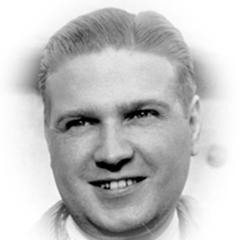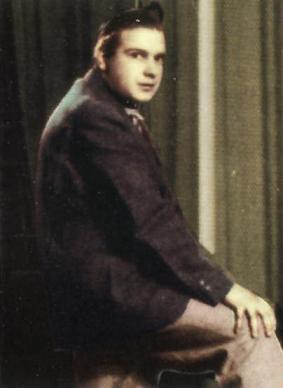Leigh Harline
 Leigh Adrian Harline was an Academy Award-winning film composer and songwriter. He was born on 26 March 1907, in Salt Lake City, Utah. He was the son of soldier Charles Härlin and Jahanna Matilda Härlin. He was the youngest of 13 children. His parents came from the village of Härfsta in Simtuna parish, Sweden. They were baptized members of The Church of Jesus Christ of Latter-day Saints in 1888, and moved to Salt Lake City, Utah in 1891. Once in the United States, they changed their surname to Harline. Leigh was baptized a member of the Church at age eight.
Leigh Adrian Harline was an Academy Award-winning film composer and songwriter. He was born on 26 March 1907, in Salt Lake City, Utah. He was the son of soldier Charles Härlin and Jahanna Matilda Härlin. He was the youngest of 13 children. His parents came from the village of Härfsta in Simtuna parish, Sweden. They were baptized members of The Church of Jesus Christ of Latter-day Saints in 1888, and moved to Salt Lake City, Utah in 1891. Once in the United States, they changed their surname to Harline. Leigh was baptized a member of the Church at age eight.
He attended Granite High School in Salt Lake City, Utah, and later studied at the University of Utah. After graduating from the University of Utah, he studied piano and organ with Mormon Tabernacle Choir conductor, J. Spencer Cornwall.
In 1928, he moved to California and worked as a composer, conductor, arranger, instrumentalist, singer, and announcer at radio stations in San Francisco and Los Angeles. He arranged music for the first transcontinental radio broadcast to originate from the West Coast in 1931, and was then hired by Walt Disney in 1932, where he scored over 50 tunes, including tunes for the Silly Symphonies cartoon series in the 1930s. He became well known for his “musical sophistication that was uniquely ‘Harline-esque’ by weaving rich tapestries of mood-setting underscores and penning memorable melodies for animated shorts and features.”
He won the Academy Award for Best Original Music Score and the Academy Award for Best Original Song for “When You Wish Upon a Star,” featured in Disney’s classic film Pinocchio (1940). The tune later became the theme song for the Disney television series, The Wonderful World of Disney.
 Leigh worked with Frank Churchill, Larry Morey, and Paul J. Smith on such Disney film tunes as “I’m Wishing,” “Whistle While You Work,” “Heigh-Ho,” and “Some Day My Prince Will Come” in Disney studio’s first animated feature-length cartoon Snow White and the Seven Dwarfs in 1937.
Leigh worked with Frank Churchill, Larry Morey, and Paul J. Smith on such Disney film tunes as “I’m Wishing,” “Whistle While You Work,” “Heigh-Ho,” and “Some Day My Prince Will Come” in Disney studio’s first animated feature-length cartoon Snow White and the Seven Dwarfs in 1937.
In 1940 he joined the American Society of Composers, Authors and Publishers (ASCAP). In 1941, he left Disney to compose for other studios. His impeccable list of credits includes Road to Utopia (1945), Nocturne (1946), The Bachelor and the Bobby-Soxer (1947), The Boy with Green Hair (1948), Mr. Blandings Builds His Dream House (1948), Monkey Business (1952), The Desert Rats (1953), Good Morning, Miss Dove (1955), 23 Paces to Baker Street (1956), Ten North Frederick (1958), The Remarkable Mr. Pennypacker (1959), The Wonderful World of the Brothers Grimm (1962), and 7 Faces of Dr. Lao (1964).
Leigh was also nominated for Academy Award for Best Original Musical (1943, 1944). He received his first Oscar nomination for “Someday My Prince Will Come.” He was nominated for Oscars for scoring The Pride of the Yankees, Johnny Come Lately, and The Wonderful World of the Brothers Grimm. He also composed for television, including series Ben Casey and Disney’s Daniel Boone. His other popular song compositions include “Hi-Diddle-Dee-Dee,” “Give a Little Whistle,” and “Jiminy Cricket.”
He died on 10 December 1969, in Long Beach, California, from complications from throat cancer, and is buried in Valhalla Memorial Park Cemetery. He was inducted into the Disney Legends in 2001.
Follow Leigh Harline
Recent Posts
Dynamic Sibling Duo Ammon and Liahona Olayan Making Music Together
Utah siblings Ammon (19) and Liahona (18) Olayan whose heritage is rooted in Hawaii, are the two oldest of nine siblings. In addition to writing music and singing, Liahona is a self-trained pianist and Ammon plays guitar and ukulele. Ammon is also a Brigham Young...
The Brett Family Brings Christmas Cheer to Branson Missouri One More Time
The Brett Family Christmas Show at Dick Clark’s American Bandstand Theater in Branson, Missouri, has been a highlight of the Christmas season for several years. The incredible award-winning two-hour show features members of the Brett family performing holiday...
David James Archuleta Delivers a Powerful Message and Performs at LoveLoud Festival 2022
After being put on hold for two years due to the pandemic, the LoveLoud Festival returned to Salt Lake City, Utah. The event, which was hosted by Imagine Dragon’s frontman, Dan Reynolds, was held at the Vivant Arena on Saturday, 14 May 2022. According to the...
David Archuleta Returns to American Idol But For A Different Reason
World-renown entertainer, David James Archuleta, began his journey of fame and stardom after becoming the runner-up on season seven of the ABC reality show American Idol. Fourteen years ago, in 2008, on the night that Ryan Seacrest revealed that David Cook, and not...
Jay Osmond’s Musical, The Osmonds – A New Musical, Continues to Receive Rave Reviews
For more than half a century, the world-famous Osmonds have been entertaining audiences of all ages. From their first performances for Walt Disney at Disney Land to their weekly appearances on the Andy Williams Show to worldwide tours, appearances on their own...
David Archuleta and the Lyceum Philharmonic at American Heritage School Perform an Orchestrated Version of “My Little Prayer”
The name David Archuleta is well known throughout the world in the entertainment industry. From an early age, the now 31-year-old (28 December 1990) singer-songwriter entertainer has been capturing the hearts of audiences of all ages. David was only 10 years old when...







